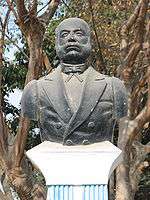Casma
| Casma | |
|---|---|
| Town | |
| Nickname(s): Tierra del Eterno Sol (Land of the Eternal Sun) | |
 Casma Location of in Peru | |
| Coordinates: 9°28′27″S 78°18′38″W / 9.47417°S 78.31056°W | |
| Country |
|
| Region | Ancash Region |
| Province | Casma Province |
| Elevation | 210 m (680 ft) |
| Population | |
| • Estimate (2015)[1] | 29,343 |
| Time zone | PET |
Casma is a city in the Ancash Region, Peru. It is located in the Casma Valley. Its surface has 1 204,85 km².

Its people venerate Santa Maria Magdalena and its day is celebrated on July 22.
Some of the largest prehistoric monuments around the world are situated in the Casma Valley and in the Sechín Valley. The pyramid, main square, and circular sunken courtyard complexes extend over one kilometer in length. In February 2008 archaeologists uncovered a ceremonial plaza which has been dated to 5,500 years ago, making it one of the oldest structures ever found in the Americas.
History
Sechin Bajo archaeological site
German and Peruvian archeologists work at the circular 5,500-year-old sunken ceremonial plaza, built of stones and adobe, part of the Sechin Bajo archaeological complex in Casma, Andes foothills, 330 kilometers (210 mi) northwest of Lima, Feb. 2008. The archeologists say the plaza is the oldest known monument in Peru.
Chankillo archaeological site
The Thirteen Towers of Chankillo (chanquillo) run north to south along a low ridge within a fourth-century BCE architectural complex in the Casmas valley in north coastal Peru. From hypothesized observing positions within nearby buildings to the west and east, the towers form an artificial, toothed horizon that roughly spans the annual rising and setting arcs of the Sun. The Chankillo towers are interpreted as marking positions of the apparent annual solar movement along the horizon, and as evidencing Sun cults, preceding the Sun pillars of Cusco by almost two millennia.[2]
Notes
- 1.^ The Thirteen Towers of Chankillo and their connection to the rising and the setting arcs of the Sun has not been proven.
References
- ↑ Perú: Población estimada al 30 de junio y tasa de crecimiento de las ciudades capitales, por departamento, 2011 y 2015. Perú: Estimaciones y proyecciones de población total por sexo de las principales ciudades, 2012-2015 (Report) (Instituto Nacional de Estadística e Informática). March 2012. Retrieved 2015-06-03.
- ↑ Ghezzi, Ivan; and Clive Ruggles (2 March 2007). "Chankillo: A 2300-Year-Old Solar Observatory in Coastal Peru". Science (Washington, DC: AAAS) 315 (5816): pp. 1239–1243. doi:10.1126/science.1136415. ISSN 0036-8075. OCLC 110607624. PMID 17332405.
External links
Coordinates: 9°28′27″S 78°18′38″W / 9.47417°S 78.31056°W